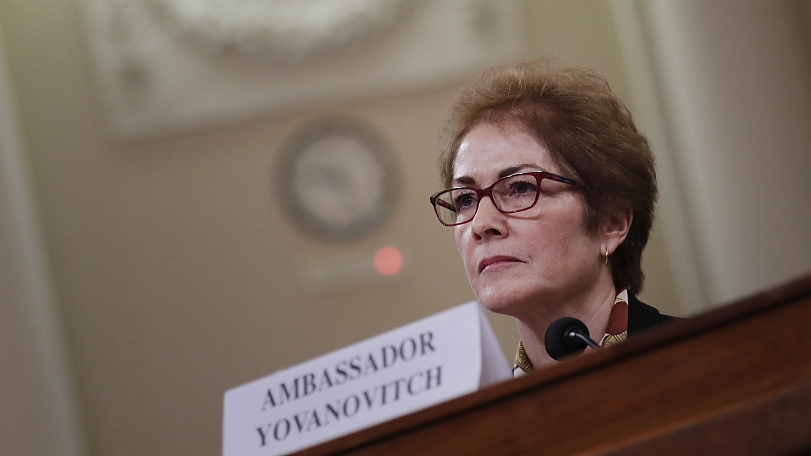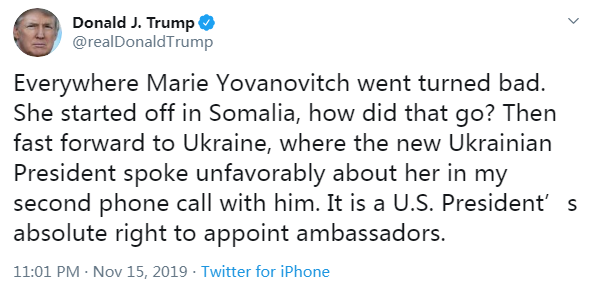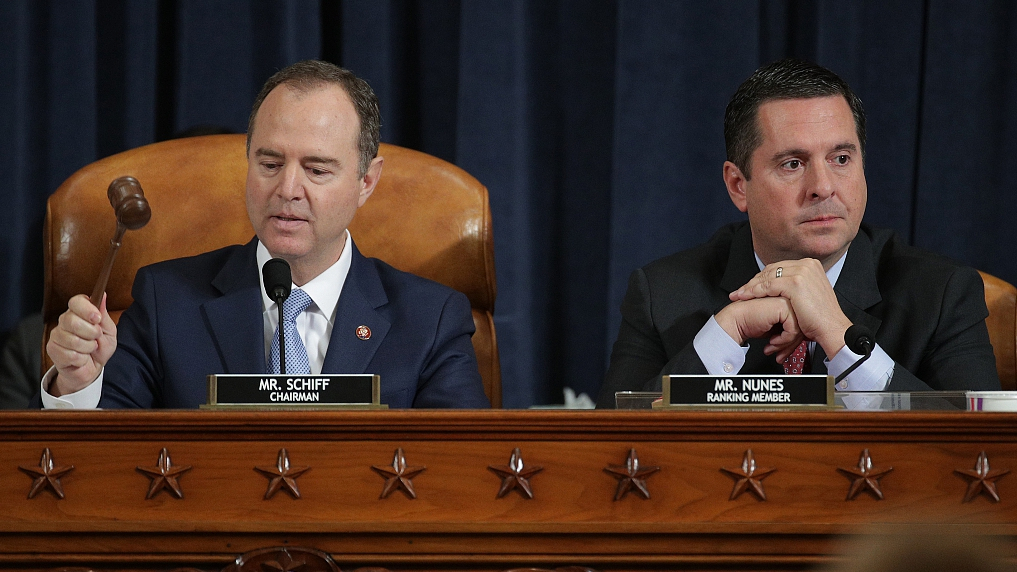U.S. President Donald Trump targeted a Twitter attack at a former U.S. ambassador to Ukraine on Friday as she was testifying to an impeachment hearing in Congress.
The extraordinary moment, that Democrats said amounted to witness intimidation, could amount to further evidence against the president.
What did Trump do?
Trump blasted Marie Yovanovitch, a 33-year career diplomat, as she explained to the second day of televised impeachment hearings how she had fought corruption in Ukraine and how the Trump administration abruptly removed her from her post earlier this year.
Democrats say Yovanovitch was pulled back to Washington to clear the way for Trump allies to persuade Ukraine to launch corruption probes into Democratic presidential contender Joe Biden and his son Hunter, who was on the board of a Ukrainian energy company.

Marie Yovanovitch, former U.S. ambassador to Ukraine, listens during a House Intelligence Committee impeachment inquiry hearing, Washington, D.C., November 15, 2019. (Photo: VCG)
As Yovanovitch testified, Trump fired off criticism on Twitter in a move Democrats labeled "real-time" witness intimidation.
"Everywhere Marie Yovanovitch went turned bad. She started off in Somalia, how did that go?" Trump asked.
How did Yovanovitch react?
Representative Adam Schiff, who is chairing the hearing in the House Intelligence Committee, asked Yovanovitch for her reaction to the tweet. She said it was "very intimidating.”
"I can't speak to what the president is trying to do, but I think the effect is to be intimidating," she said.

Twitter Screenshot
Schiff replied, "Well, I want to let you know, ambassador, that some of us here take witness intimidation very, very seriously."
At the White House, Trump told reporters he did not think his tweets were intimidating. "I have the right to speak. I have freedom of speech just as other people do."
What else did Yovanovitch say?
Yovanovitch claims she was targeted by a smear campaign orchestrated in part by Trump's personal attorney Rudy Giuliani, who is accused of helping to coordinate the president's effort to pressure Kiev.
Yovanovitch told lawmakers her removal as ambassador plunged America's Ukraine policy into "disarray" and damaged Washington's global standing.

Representative Adam Schiff, Democrat and House Intelligence Committee chair, speaks as Representative Devin Nunes, Republican and ranking member of the committee, listens during an impeachment inquiry hearing with Marie Yovanovitch, Washington, D.C., November 15, 2019. (Photo: VCG)
And when she read the memorandum of Trump's July 25 call with Ukraine's President Volodymyr Zelensky, in which the U.S. leader called her "bad news" and said she was "going to go through some things," she said "it sounded like a threat."
Yovanovitch was "shocked" and "devastated" to learn how Trump had personally disparaged her, she added. But above all, Yovanovitch expressed alarm that envoys could be so easily "kneecapped" by false accusations and corrupt foreign influences.
What's the backstory?
Yovanovitch was removed from her post as ambassador to Kiev in May after coming under attack by Giuliani at a time when he was working to persuade Ukraine to carry out two investigations that would benefit the president politically.
Giuliani also was trying to engineer a Ukrainian investigation into a debunked conspiracy theory embraced by some Trump allies that Ukraine, not Russia, interfered in the 2016 U.S. election.
The main focus of the impeachment inquiry is a July 25 phone call in which Trump asked Ukrainian President Volodymyr Zelenskiy, who took office in May, to open the investigations.
Democrats are looking into whether Trump abused his power by withholding U.S. security aid to Ukraine as leverage to pressure Kiev to investigate former vice president Biden, who is a leading contender for the Democratic nomination to take on Trump in 2020.
The money, approved by Congress to help U.S. ally Ukraine combat Russia-backed separatists, was later provided to Ukraine.
Do Americans back impeachment?
This week's televised impeachment hearings do not appear to have changed many minds about Trump, with public support for his impeachment about the same before and after the first U.S. diplomats – William Taylor and George Kent testified – according to a Reuters/Ipsos poll.
The poll showed that 44 percent of American adults said Trump "should be impeached," while 40 percent said he "should not be impeached." A similar poll that ran earlier in the week found 45 percent supported impeachment and 42 percent opposed it.
The poll also found that about 68 percent of Americans said they were following the hearings and about 25 percent said they had not paid any attention to the proceedings.
Overall, the poll found that 41 percent of the public approved of Trump, while 54 percent disapproved.
(With input from AFP, Reuters)


